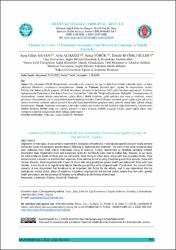| dc.contributor.author | Şahan, Ayşe Gülay | |
| dc.contributor.author | Açıkgöz, Ayla | |
| dc.contributor.author | Yörük, Selda | |
| dc.contributor.author | Güler, Döndü Sevimli | |
| dc.date.accessioned | 2024-02-05T15:58:17Z | |
| dc.date.available | 2024-02-05T15:58:17Z | |
| dc.date.issued | 2023 | |
| dc.identifier.issn | 2146-9601 | |
| dc.identifier.issn | 2147-2238 | |
| dc.identifier.uri | https://doi.org/10.53424/balikesirsbd.1109630 | |
| dc.identifier.uri | https://search.trdizin.gov.tr/yayin/detay/1200021 | |
| dc.identifier.uri | https://hdl.handle.net/20.500.12462/13937 | |
| dc.description.abstract | Bu çalışmada COVID-19 pandemisi sırasında evde yaşayan 65 yaş ve üstü bireylerdeki yalnızlık algısı ve bunu etkileyen faktörlerin incelenmesi amaçlanmıştır. Gereç ve Yöntem: Kesitsel tipte yapılan bu araştırmanın verileri Türkiye’nin Sakarya İlinde yaşayan, tabakalı örnekleme yöntemi ile belirlenen 1093 yaşlı bireyden toplanmıştır. Verilerin toplanmasında Tanımlayıcı Veri Kayıt Formu ve Yaşlılar İçin Yalnızlık Ölçeği kullanılmıştır. Bulgular: Çalışmamızda evli olmayanların, kentsel alanda yaşayanların, eğitim düzeyi düşük olanların, geliri giderine eşit veya az olanların, sosyal güvencesi olmayanların, eşi ile yaşayanların kronik hastalığı olanların COVID-19 tanısı alanların, genel sağlık algısı çok iyi/iyi olanlar ile hobisi olanların toplam yalnızlık düzeyleri karşılaştırıldıkları gruplara oranla anlamlı olarak daha yüksek olduğu bulunmuştur. Sonuç: Araştırma sonucunda, yalnızlığın yaşlılar için önemli bir risk faktörü olduğu belirlenmiş, katılımcıların medeni durumu, ikamet ettiği yer, eğitim, çalışma ve gelir durumu, birlikte yaşadığı kişiler, genel sağlık algısı, hobi varlığının yalnızlık duygusunda etkili olduğu saptanmıştır. | en_US |
| dc.description.abstract | Objective: In this study, it was aimed to examine the perception of loneliness in individuals aged 65 and over living at home during the COVID-19 pandemic and the factors affecting it. Material and Methods: The data of this cross-sectional study were collected from 1093 elderly individuals living in Sakarya, Turkey, determined by stratified sampling method. Descriptive Data Registration Form and Loneliness Scale for the Elderly were used to collect data. Results: In our study, the total loneliness levels of those who are unmarried, those living in urban areas, those with low education levels, those whose income is equal to or less than their expenses, those without social security, those living with their spouses, those with chronic diseases, those diagnosed with COVID-19, those with very good/good general health perception and those who have hobbies. It was found to be significantly higher than the groups they were compared with. Conclusion: As a result of the research, it was determined that loneliness is an important risk factor for the elderly, and it was determined that the participants' marital status, place of residence, education, employment and income status, people they live with, general health perception, and the presence of hobbies were effective in the feeling of loneliness. | en_US |
| dc.language.iso | tur | en_US |
| dc.relation.ispartof | Balıkesir Sağlık Bilimleri Dergisi (BSBD) | en_US |
| dc.rights | info:eu-repo/semantics/openAccess | en_US |
| dc.rights | Attribution-NonCommercial 4.0 International | * |
| dc.rights | https://creativecommons.org/licenses/by/4.0/ | * |
| dc.subject | Yalnızlık | en_US |
| dc.subject | Yaşlı | en_US |
| dc.subject | Covid-19 | en_US |
| dc.subject | Pandemi | en_US |
| dc.subject | Loneliness | en_US |
| dc.subject | Elderly | en_US |
| dc.subject | Pandemic | en_US |
| dc.title | Türkiye’de Covid-19 pandemisi sırasında yaşlı bireylerin yalnızlığı ve ilişkili faktörler | en_US |
| dc.title.alternative | Loneliness of elderly ındividuals and associated factors during the Covid-19 pandemic in Turkey | en_US |
| dc.type | article | en_US |
| dc.contributor.department | Balıkesir Üniversitesi | en_US |
| dc.identifier.volume | 12 | en_US |
| dc.identifier.issue | 3 | en_US |
| dc.identifier.startpage | 603 | en_US |
| dc.identifier.endpage | 610 | en_US |
| dc.relation.publicationcategory | Makale - Ulusal Hakemli Dergi - Kurum Öğretim Elemanı | en_US |
| dc.buozel | trdizinideal | en_US] |
| dc.department-temp | Ege Üniversitesi, Sağlık Bilimleri Enstitüsü, İç Hastalıkları Anabilim Dalı, İzmir, Türkiye Dokuz Eylül Üniversitesi, Sağlık Hizmetleri Meslek Yüksekokulu, Tıbbi Hizmetler ve Teknikler Bölümü, İzmir, Türkiye Balıkesir Üniversitesi, Sağlık Bilimleri Fakültesi, Ebelik Bölümü, Balıkesir, Türkiye Sakarya Üniversitesi, Eğitim ve Araştırma Hastanesi, Sakarya, Türkiye | en_US |
| dc.identifier.trdizinid | 1200021 | en_US |
| dc.identifier.doi | 10.53424/balikesirsbd.1109630 | |


















